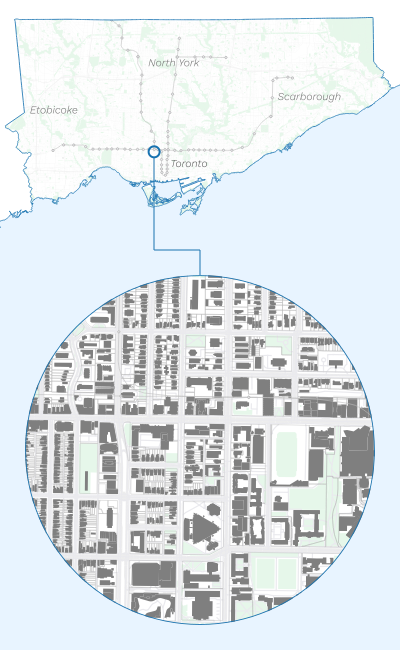Students Co-Op
Toronto’s competitive housing market is especially unforgiving for students, who often experience difficulty securing affordable and accommodating rental housing near campus. Some students like S.J, however, rely on Co-Op housing: A non-profit, high-density, affordable alternative to the traditional rental model. S.J and his 12 housemates each have their own individual rooms, but share amenities like the washroom and kitchen.
“Basically, we're all students or recent grads like me, that help each other with housekeeping. We all pay cheap rent; we help each other in the house. It's divided into a bunch of rooms, and there are three shared washrooms and a shared kitchen. The kitchen is on the first floor, so a big kitchen for all of us.”
“There’s like a three and a half times difference between a single bedroom condo in the Annex and what I am paying now. I’m seeing prices in the Annex and there seems to be a minimum rent of $2300 for one bedroom compared to this”
Because Co-Op housing is owned by a non-profit entity on behalf of its residents, S.J and his housemates enjoy rents that are several times cheaper than traditional rents in the surrounding Annex neighbourhood, while still retaining access to all of the commercial and public amenities that make the Annex such a desirable place to live.
“There’s like a three and a half times difference between a single bedroom condo in the Annex and what I am paying now. I'm seeing prices in the Annex and there seems to be a minimum rent of $2300 for one bedroom compared to this,” said S.J. “Our house is also close to lines 1 and 2, near Spadina and St. George Stations. There is no need to pay a lot to commute, I just walk to campus and walk to work. This Annex area is so nice, Bloor street has a bunch of nice stores and gyms. For someone like me who is a recent grad that is working, it is very convenient.”
As S.J’s case also illustrates, co-op living is truly cooperative: Before moving in, prospective residents of S.J’s co-op are interviewed to ensure that they can contribute to building a like-minded social community within the co-op itself, which is especially important given the communal nature of co-op living. Residents must come together to do chores, cook, and live together harmoniously.
“We interview people before they come in, so we get to know them, and if they match how we vibe. We don’t get the whole decision, but we have some influence. In the past, the average age was like 38 and for most students that are undergrads it's hard to live with older people in a different generation. The main co-op offers to interview people before having them come in, so there's like a close age and now the average is like 20 to 23 which is okay.”
While co-op housing is incredibly affordable, spaces in Toronto are heavily restricted because of low supply, especially for those who are not university students. S.J, for example, is already preparing for when he is inevitably forced to leave his current co-op to make room for another student to take his place. Unfortunately, staying in another co-op might not be an option for him.
“I reached out to other co-ops, and the wait times are very long. The wait time to get in is 20 years,” S.J explained, laughing. “It’s crazy. I called them and I emailed them, like, did you write something wrong? Is there an additional zero? But no, it was 20.”
Finding ways to build more high-density, co-op housing will be crucial, both for lowering waiting times for this popular housing alternative and promoting housing affordability across the city.










